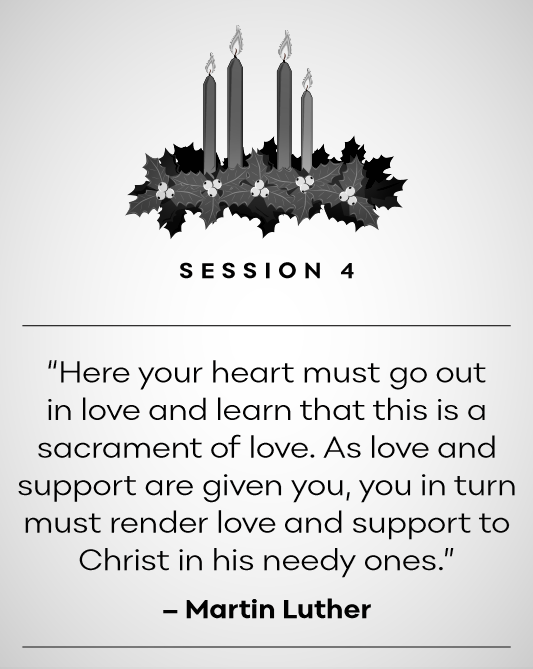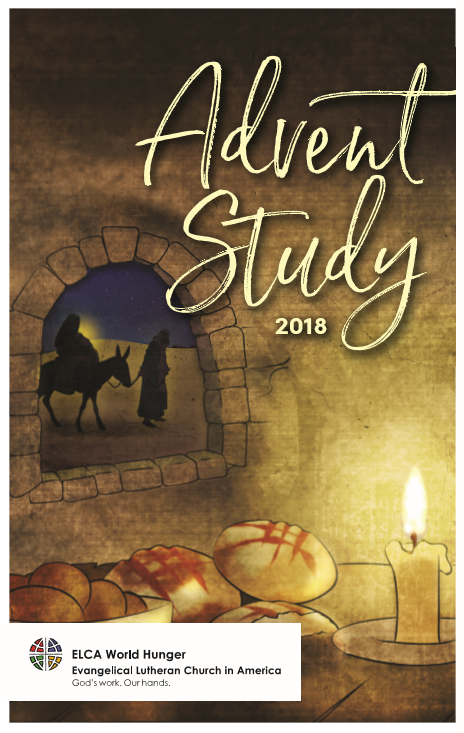The guests sit back, satisfied. The plates are scraped clean. The utensils are carefully stowed for the next meal. Where do we go from here?
In the first session of this study, Babette’s guests had finished their sumptuous, if strange, feast, praising the talents of their hostess, if not the exact recipes she brought to life. The eponymous meal was not the end of the story, however. Thirty-year-old spoiler alert: At the end of the film, Babette informs the two sisters for whom she works that she has spent all her newfound wealth on the meal and so, rather than returning to France, will be staying on as their live-in servant. Almost as important as the climax of the meal is the denouement of Babette’s decision to remain in their service. The feast is not a farewell dinner but rather a celebration of transition — from the servitude she was forced into by circumstance to the loving service she continues by choice.
In the second session of this study, Martin Luther extolled the virtues of Abraham, whose radical hospitality created an opening — both literal and figurative — for Abraham and Sarah to hear the promise of God in their humble tent. It was a model of hospitality Luther commended to the church, that it might be a place of refuge for all who are vulnerable, for all the strangers-maybe-angels in our midst. The people of God are called to be church for the sake of the world — and this starts with the concern for the well-being of others that gives rise to hospitality.
In the third session of this study, Paul admonished Peter for creating tables that were exclusive rather than inclusive. Peter had refused to dine with Gentiles and, in so doing, had decided who was in and who was out based on the law rather than on grace. Paul also held the Corinthians to account for their treatment of people in need, chastising them for mimicking in the church the pattern of relationships already present in the world, where those with earth and power received the places of prestige, and those in poverty had to make do with scraps.
Each of these threads is pulled together in Luther’s teaching on the most important meal in the Christian church, Holy Communion. Calling Holy Communion a “blessed sacrament of love,” Luther writes:
The fruit of the sacrament is nothing other than love. As Christ gave himself for us with his body and blood in order to redeem us from all misery, so we too are to give ourselves with might and main for our neighbor…That is how a Christian acts.
For Luther, Holy Communion draws those at the altar closer to God and closer to one another. To partake of the sacrament authentically, one must remember both dimensions — the presence of grace in the sacrament and the willingness to bear the burdens of the other people at the table. Holy Communion is a means of grace that forms us to be signs of grace to one another.
In Holy Communion, we are reminded of Christ’s sacrifice for us and are invited to give ourselves in like manner to one another. The sacred meal is nourishment for a sacred vocation. In fact, for Luther, the sacrament has no meaning without this: “For the sacrament has no blessing and significance unless love grows daily and so changes a person that he is made one with all others,” he writes. At the table, a community is fed and formed for service in the world. The sacrament’s significance does not end at the table where we eat but extends into the world in which we live — a world we shape by our witness to the hospitality of God, who welcomes all to the table. It is a somber meal of penitent reflection and a celebratory feast of new beginnings.
This season, as we have prepared for the arrival of Christ, it may be easy to see Christmas as the end, the culmination of what has gone before, rather than as the beginning, the inauguration of what is to come. But the coming of Christmas is not merely the end of Advent. It is the start of the life of the church in the world. Freed from sin and death by Jesus Christ, it is the beginning of the servitude we choose — service of the world in gratitude for the grace we have received. It is a celebration of the freedom to join with others at the table and the freedom to concern ourselves wholly with the needs of our neighbors. In Advent, the church is created to be part of the re-creation of the world begun on Christmas.
The “reason for the season” is Christ’s birth, certainly. But it is also the creation of the people of Christ, who are called into the world to “do justice, and to love kindness, and to walk humbly with your God” (Micah 6:8).
The guests sit back, satisfied. The plates are scraped clean. The utensils are carefully stowed for the next meal. Now, the work of Christmas begins.
Questions for reflection:
- What memorable meals in your life have brought you into relationship with other people at the table? How did dining together help you become closer to them?
- How does Holy Communion help nourish you for service of others?
- Where is God inviting you to be in the new year?
- How are you renewed for service of the world by the holiday season?
Prayer
Gracious God,
we give you thanks for the many ways you nourish us — with food, with family, with friends, with faith. In you, we are made new to be instruments of your grace in our world. Recall to us the many places of need in our world — places of injustice and violence, of hunger and poverty. Enrich us with love at the tables you set that we may seek justice, love kindness and walk humbly with you into the future you have promised.
In your holy name,
Amen.
Learn
To download this entire Advent study, click on the cover image below. To other congregational resources from ELCA World Hunger, please visit www.elca.org/Resources/ELCA-World-Hunger.
Give
Gifts to ELCA World Hunger are acts of love toward our neighbors living with hunger and poverty both here and around the world. This Advent, join ELCA World Hunger in working toward a just world where all are fed.
Connect
Sign up here and receive news, information and the latest resources from ELCA World Hunger.


